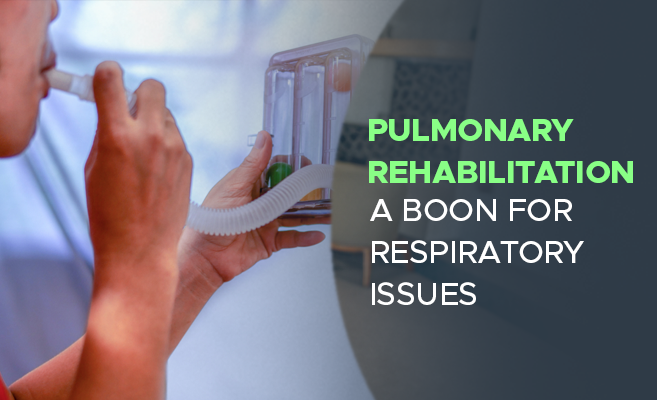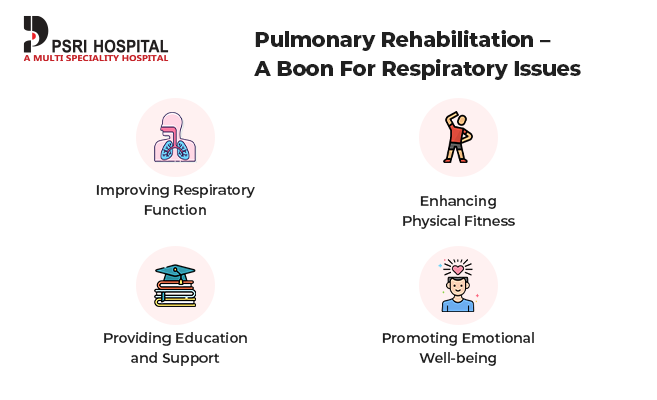Pulmonary Rehabilitation – A Boon For Respiratory Issues

Breathing is something we often take for granted until it becomes a struggle. For individuals living with chronic respiratory conditions such as chronic obstructive pulmonary disease (COPD), asthma, or lung cancer, each breath can be a challenge. In such cases, pulmonary rehabilitation can be a game-changer, offering a comprehensive approach to managing and improving respiratory health.
If you are curious to know more about Pulmonary Rehabilitation, you have arrived at the right place. In this blog, let’s discuss the goals and benefits of pulmonary rehabilitation and explain why it’s a boon for respiratory issues.
What is Pulmonary Rehabilitation?
Pulmonary Rehabilitation means restoring normal airway and lung mechanics with training and therapy. It includes but is not limited to exercise training, education, and behaviour change, which is designed to improve the physical and psychological condition of the affected population. It is part of the management program if you or anyone you know suffer from one of the following:
- Chronic lung diseases like chronic obstructive pulmonary disease (COPD) and Emphysema
- Pulmonary fibrosis, as seen in Post COVID Lung Disease etc.
- Interstitial Lung Disease (ILD)
- Cystic Fibrosis or bronchiectasis etc.
There is hope that the strength of the respiratory muscle system can be improved and that you may enjoy a more full and active life through pulmonary rehabilitation. In a study, it was found by McCarthy B, Casey D, Devane D, Murphy K, Murphy E, and Lacasse Y. that Pulmonary Rehabilitation significantly improved health-related Quality Of Life and exercise capacity in individuals with Chronic Obstructive Pulmonary Disorder (COPD) compared to usual care.
It was because these programs are specifically designed for individuals and are also known as ” tailor-made” in order to help the entire respiratory system. So, it can improve function and reduce symptom severity, which, in turn, improves quality of life.
Goals of Pulmonary Rehabilitation
The primary goals of pulmonary rehabilitation are:

- Improving Respiratory Function: Through exercises specifically tailored to enhance breathing techniques and strengthen the muscles involved in respiration, patients can experience improved lung function and reduced breathlessness.
- Enhancing Physical Fitness: Regular exercise sessions help build endurance, increase muscle strength, and promote overall physical conditioning, enabling individuals to participate in daily activities with less fatigue.
- Providing Education and Support: Pulmonary rehabilitation programs provide patients and their families with valuable education on managing their condition, proper use of medications, and strategies for coping with challenges related to respiratory issues.
- Promoting Emotional Well-being: Dealing with chronic lung diseases can take an emotional toll. Pulmonary rehabilitation addresses this by offering counselling, support groups, and techniques for managing stress and anxiety.
Benefits of Pulmonary Rehabilitation
The benefits of pulmonary rehabilitation are numerous and well-documented. Some of them are:
- Improved Exercise Tolerance: Patients who participate in pulmonary rehabilitation programs often experience a significant increase in their ability to exercise and engage in physical activities without experiencing severe shortness of breath.
- Reduced Hospitalizations: By teaching patients how to better manage their condition and recognize early signs of exacerbation, pulmonary rehabilitation can help prevent frequent hospitalizations and reduce healthcare costs.
- Enhanced Quality of Life: With improved respiratory function, increased physical capacity, and better emotional coping strategies, individuals participating in pulmonary rehabilitation often report a significant improvement in their overall quality of life.
- Increased Independence: The skills and knowledge gained through pulmonary rehabilitation can empower individuals to manage their condition more effectively, leading to greater independence and self-reliance.
- Improved Psychological Well-being: The supportive environment and educational components of pulmonary rehabilitation can help alleviate anxiety, depression, and stress associated with chronic respiratory conditions.
Who Can Benefit from Pulmonary Rehabilitation?
Pulmonary rehabilitation is typically recommended for individuals with chronic lung diseases such as COPD, asthma, pulmonary fibrosis, and lung cancer, as well as those recovering from lung surgery or respiratory infections. However, it’s important to note that the program is tailored to each individual’s specific needs and capabilities. So it is better to consult with the expert doctor at the best hospital in Delhi first.
Conclusion
Pulmonary rehabilitation is a comprehensive, personalised program that addresses the multifaceted challenges faced by individuals with chronic respiratory conditions. Combining exercise training, education, and support equips patients with the tools and strategies needed to manage their condition effectively, improve their overall quality of life, and regain a sense of control over their health.
If you or a loved one is living with a chronic respiratory condition, speak with the expert healthcare provider at PSRI Hospital about the potential benefits of pulmonary rehabilitation. Being the best hospital in Delhi, we are here to help you in every way possible. Book an appointment today!
FAQs
What is the difference between pulmonary rehabilitation and regular physical therapy?
Pulmonary rehabilitation is a comprehensive program specifically designed for individuals with chronic respiratory conditions like COPD, asthma, or lung cancer. It goes beyond just physical exercises and includes educational components, nutritional counselling, and emotional support. Regular physical therapy, on the other hand, focuses primarily on improving physical function and mobility.
How long does a typical pulmonary rehabilitation program last?
The duration of a pulmonary rehabilitation program can vary, but most programs last between 6 to 12 weeks. The specific length depends on the individual’s needs, condition, and progress. Some programs may offer ongoing maintenance sessions after the initial program is completed.
Can pulmonary rehabilitation help with oxygen therapy?
Yes, pulmonary rehabilitation can be beneficial for individuals who require oxygen therapy. The program includes education on proper oxygen use, techniques for conserving energy while using oxygen, and exercises to improve oxygen utilisation. This can lead to better management of oxygen therapy and improved quality of life.
Is pulmonary rehabilitation only for severe respiratory conditions?
No, pulmonary rehabilitation can be beneficial for individuals with various levels of respiratory impairment, ranging from mild to severe. Even those with moderate respiratory conditions can benefit from the exercises, education, and support provided in a pulmonary rehabilitation program. It’s important to consult with a healthcare professional to determine if pulmonary rehabilitation is appropriate for your specific condition and needs.

 Book An Appointment
Book An Appointment Virtual Consultation
Virtual Consultation





